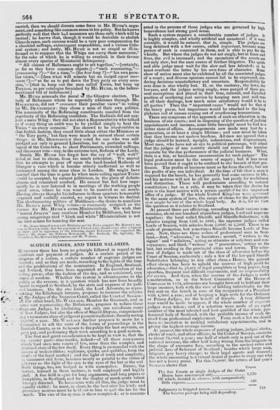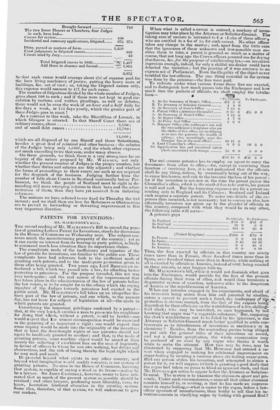SCOTCH JUDGES, AND THEIR SALARIES. ITELRTO there has been no
principle followed in regard to the aumlers and payment of judges. At a certain period of the ?regress of a nation, a certain number of supreme judges are :lamed; and so they are made, according to the lights of the time and the predilections of the nominators. In England, Scotland, Ina Lelauel, they have been appointed at the discretion of the :Aug peal er, after the fashion of the day, and so continued, very much at random. Whether the system is advantageous to the
• :,)•ablie or the reverse, is a question which has now been broadly mised in regard to Scotland, by the state and expense of its judi- ,nal business. On the one hand, the Lord Advocate, as repro- _ • • • aeriting the Edinburgh lawyers, proposes to increase the salaries a the Judges of the Supreme Court, called the Court of Session:
7a. • tile other hand, Mr.WALLaca, Member for Greenock, and in
• somo .sort representing the Reformers, proposes to reduce these • -:•$o promo _Judges, by abolishing not only one coordinate court four Judges, but also the office of Sheriff-Depute, comprehend- a numerous class of judges at present inefficient; thereby saving -,:t1,000/. a year. Mr. WALLACE further proposes to move fur a Committee to sift the state of the forms of proceedings in the Scottish Courts, so as to insure to the public the best servants, on po•1 pay, and performing their work according to a good system. The first and great consideration to be kept in view is, that the :'tir greater part—nine-tenths, indeed—of all those annoyances whichlead men into courts of law, arise from the complex and zonfused state of the law itself. Every thing is surrounded with the tns of technicalities ; sophisms, quirks, and quibbles, form the 5taple of the legal market ; and the light of truth and simplicity, statement and form, becomes nearly as painful to the vision of iawycr as the light of the sun to the eyes of the bat or the owl
S !.tch things, too, are hedged in with monopolies. Hence, the :.10.yer, learned in these matters, is well employed and highly
?aid. A fine field is open for long arguments, and long papers or .7aruphlets, in Scotland, and for the display of much acute talent 7:googly directed. To harmonize with all this, the judge must be toally skilful : he must, in short, be the best after his kind; and w• uniary motives must be held out to him to quit the bar for the alancb. The vice of the system is there completed ; or is counter- acted in the persons of those judges who are governed by high benevolence and strong good sense.
Such a system requires a considerable number of judges. It is highly complex, and wholly artificial and unnatural : if it were
scientific, it would be natural, that is, simple. The judges are long detained with a few causes, called important, because some person of rank is concerned in them, and is able to pay for the
whistle. But where the judges do not act singly, but in fours and fives, the evil is increased; and the operations of' the courts are not only slow, but the sure source of further litigation. The quick and able judge must wait for the slow and less talented; or he
must overbear the latter by his own force of character. Some show of action must also be exhibited by all the associated judges
of a court ; and diverse opinions cannot fail to be expressed, ren- dering decisions unsatisfactory and uncertain. Responsibility for acts done is also wholly lost. If, on the contrary, the laws, the lawyers, and the judges acting singly, were purged of their pre- sent corruptions and placed in their true, rational, and dignified position of rendering real service by keeping men just and true in all their dealings, how much more satisfactory would it be to all parties ? Then the " important cause " would not be that of the heavy purse, but importance would be attached to the long plebeian roll of causes arising out of overflowing transactions.
There are symptoms of the approach of such an alteration in the business of our courts ; and in disposing of the question of judicial appointments and incomes, some little foresight must be had to a better state of affairs. Arrangements now made may last for a generation, or at least a single lifetime ; and care must be taken that they become not useless burdens. All men are agreed that a judge should be learned, upright, industrious, and dispassionate. Most men, who have not an eye to political patronage, will admit that the judges of any country should not exceed the number requisite for the due performance of the judicial business. What, then is a fair, or handsome remuneration for such judges? The legal profession must be the source of supply ; but it has never been proved that it ought to be confined to one branch of that pro- fession. The profits of business must so far form the rule, but not the profits of any one individual. At the time of life that a man is required for the bench, he has generally had some success in life; and his motives will not be all for gain, but partly for usefulness and distinction. These will predominate according to natural constitution ; but as a rule, it may be taken that the desire for gain is the least motive with a person qualified for the important office of a judge. If the whole United Kingdom were governed by the same system of laws, the range of choice for the judgment- seat might be out of the whole legal body. As it is, let us view the question as it relates to Scotland. At present there are officiating, according to their various com- missions, about one hundred stipendiary judges, heal and supreme together; the local called Sheriffs and Sheriffs-Substitute, with salaries ranging from 150/. to 800/4 the supreme judges called Lords of Session, with salaries from 2,000/. to 4,300/. There is no scale of promotion, but sometimes Sheriffs become Lords of Ses- sion. Now, there are three orders of professional men in Scot- land,—first, "advocates," or barristers ; second, " writers to the signet" and " solicitors," acting as attornies or solicitors and con- veyancers; and third, "writers" or " procurators," acting as the last, but residing in the provincial cities and towns. The selec- tion of Judges is made out of the class of advocates before the Court of Session, exclusively ; only a few of the low-paid Sheriff- Substitutes belonging to any other class.. Hence, the general effort always has been to uphold the sources of' high profit for advocates,—that is, plenty of legal pamphlets or long papers, long speeches, frequent and difficult enactments, and no responsibility for es'? ors. And then, when the income of the Judges is under consideration, as in the Select Committee of the House of Commons in 1S34, advocates are brought forward to holdout their large incomes, both with the view of bidding individually for the first seat on the bench in case of the resignation of a President with 4,300/. a year, and of keeping a high scale for the Ordinary or Puisne Judges, for the benefit of friends. A very different ease would be made to appear, if the whole number of' requisite judges were taken ; and if a selection were made of an equal number of the most talented and best qualified of the whole pro-
fessional body of Scotland, with the probable income of each de- rived from professional employment. From such a list we should have no hesitation in making satisfactory appointments, and in giving the highest average income. At present, the whole expenses of paying judges, judges clerks, clerks of court, and other officers, in the Court of Session, amounts to about 70,000/. a year ; one half of which only is paid out of the national revenue, the other half being wrung from the litigants in the shape of excessive fees, according to the ancient rules and judicial Acts of Seaerunt of Scotland ; besides which large sum, litigants pay heavy charges to their legal agents and counsel ; the whole amounting to a virtual denial of justice to every one who has not a heavy purse. For this 70,000/. the return of last years bu,iness shows that Causes The five Courts or single Judges of the Outer House have entertained only 1,770
Of which, decided itt absence, with comparatively
little expense 546 Judgments in litigated causes The balance perhaps being still depending. 710 Brought forward .........
TI.e two Inner Houses or Chambers, four Judges in each, have had—
710
Causes for review 456
Incidental and summary applications, litigated 373 373 Ditto, passed as matters of form 1,339
Final judgments in litigated causes
339
Causes tried by Jury ............ ............ ............
43 Total litigated causes in 1836
7K7,
1,467 Add those in absence and formal ...... '„,.; 1,905 3,372 So that each cause would average about 21/. of expense paid for the bare living machinery of justice, putting the heavy costs of buildings, &c. out of view ; or, taking the litigated causes only, this expense would amount to 47/. for each cause.
The number of litigations divided by the whole number of J udges, gives about 100 to each ; and if these were not kept in good cir- culation by motions and written pleadings, as well as debates, there would not be even the work of an hour and a half daily for five days a week, or 144 days yearly, which the greater part of these Judges pass in court !
As a contrast to this work, take the Sheriffilom of Lanark, in which Glasgow is situated. In that Sheriff Court there are of ordinary causes, about . . 2,100; and of small debt causes 12,700; 14,800 ; which are all disposed of by one Sheriff and three Substitutes, besides a great deal of criminal and other business : the salaries of the Judges being only 1,6001., and the whole other expenses not much exceeding twice that sum, under many abuses.
On these grounds, we think there is a very strong case for an inquiry of the nature proposed by Mr. WALLACE, not only whether the present number of Judges is the proper number, but whether their duties and salaries are fitly adjusted ; and whether the forms of proceedings in their courts are such as are required for the despatch of the business. Judging further from the number of bills about Courts in Scotland continually before Par- liament, we think the people of Scotland must be right in de- manding still more sweeping reforms in their laws and the admi- nistration of them, than they have yet received from tinkering reformers.
The motions we have referred to arc fixed for Thursday the 22d instant; and we shall then see how far Reformers or Obstructives are to prevail in forwarding or thwarting improvement in this Very important direction.



























 Previous page
Previous page